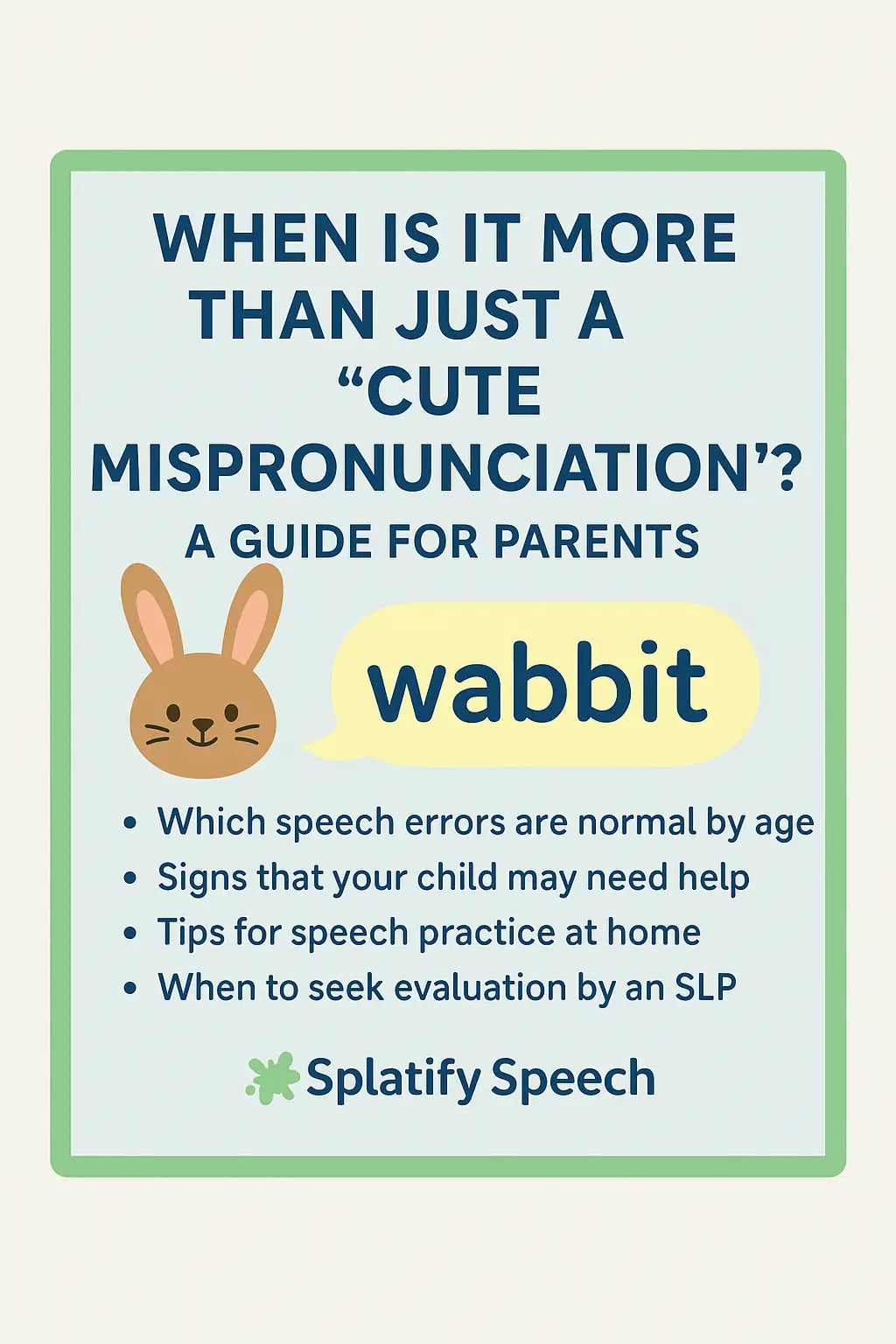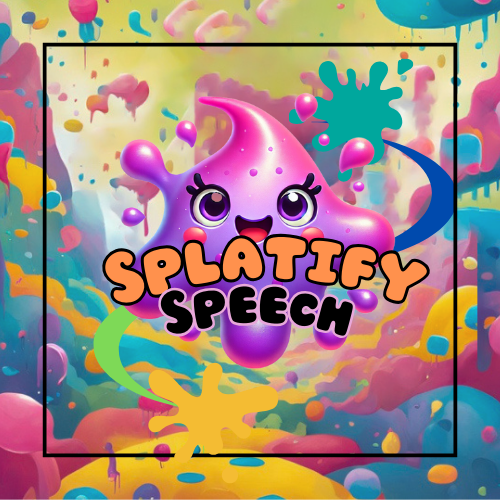
When Is It More Than Just a ‘Cute Mispronunciation’? A Guide for Parents
When Is It More Than Just a ‘Cute Mispronunciation’? A Guide for Parents
By Jennifer Spencer, M.S., CCC-SLP | Pediatric Speech-Language Pathologist at Splatify Speech
“Aww, he calls it a ‘wabbit’—how cute!”
As parents, we’ve all smiled at our child’s adorable attempts to say big words. But how do you know if that sweet mispronunciation is just a normal part of development—or a sign your child might need help from a speech-language pathologist?
In this guide, I’ll walk you through the difference between typical and atypical speech errors, which sounds to watch for, when to seek support, and how you can help your child speak more clearly—without taking away their confidence or personality.
🎯 What Are Speech Sound Errors?
Speech sound errors (also called articulation errors) happen when a child doesn’t pronounce a sound the way adults do. Common types include:
-
Substitutions (e.g., “wabbit” for “rabbit”)
-
Omissions (e.g., “nana” for “banana”)
-
Distortions (e.g., a slushy “s”)
-
Additions (e.g., “buhlue” for “blue”)
Many of these are perfectly normal—at the right age.
✅ What’s Normal (and Cute!) at Different Ages?
Here’s a general guideline of when kids typically master different speech sounds:
| Sound(s) | Usually Mastered By Age |
|---|---|
| p, b, m, h, w | 2–3 years |
| d, n, k, g, t | 3–4 years |
| f, y | 4 years |
| l, s, v, z | 5–6 years |
| sh, ch, j | 6 years |
| th, r | 6–7+ years |
🔍 Example: If your 2-year-old says “wabbit” instead of “rabbit,” it’s likely developmentally appropriate. But if your 6-year-old still says “wabbit,” it may be time to check in with a speech therapist.
🚩 Signs It May Be More Than Just Cute
You may want to consult a speech-language pathologist if you notice any of the following:
🔈 Unclear Speech
-
Strangers frequently ask “What did they say?”
-
Your child gets frustrated when they’re not understood.
🕒 Delayed Sound Development
-
Sounds that should be mastered by their age are still missing.
-
Persistent errors (like “th” for “s”) after age 6.
🧠 Learning or Reading Challenges
-
Trouble sounding out words.
-
Frequent confusion with letters/sounds during reading.
💬 Frustration or Avoidance
-
Your child avoids talking or speaking in public.
-
They get upset when asked to repeat something.
🧠 What Causes Ongoing Speech Errors?
Persistent articulation problems may stem from:
-
Oral-motor weakness or coordination issues
-
Phonological processing difficulties (pattern-based errors)
-
Hearing problems (especially undetected mild hearing loss)
-
Family history of speech or language delays
-
Neurological differences (like apraxia of speech or developmental delay)
These aren’t anyone’s fault—but early help makes a big difference.
👩🏫 What Does a Speech Therapist Do?
A speech-language pathologist (SLP) can assess your child’s sound production and determine:
-
Which errors are age-appropriate
-
Which ones might benefit from therapy
-
The best strategies for helping your child succeed
SLPs use fun, play-based methods to help your child hear, feel, and produce sounds correctly—and build confidence along the way.
🏡 What Can I Do at Home?
You don’t have to be a speech therapist to help your child! Try these at-home strategies:
1. Model, Don’t Correct
Repeat their phrase with the correct pronunciation casually:
Child: “I see the wabbit!”
You: “Yes! That rabbit is so fluffy!”
2. Play Sound Games
Practice listening for sounds (“Do you hear an ‘S’ in snake?”), or try tongue twisters together.
3. Read Books That Emphasize Target Sounds
Choose books that repeat tricky sounds, like “Sheep in a Jeep” or “The Very Busy Spider.”
4. Stay Patient and Encouraging
Celebrate their effort—not just their accuracy. Progress happens with practice, not pressure.
📘 Want More Guidance?
Check out my book:
Speech Success at Home
A parent-friendly guide packed with:
-
Expert tips on how to support speech and language during everyday routines
-
Fun, low-stress activities to build articulation skills
-
Confidence-boosting tools you can use starting today!
👉 Grab your copy here
📌 Use hashtag #SpeechSuccessAtHome to share your journey and connect with other parents!
✋ Final Thoughts
Mispronunciations are a normal—and even endearing—part of growing up. But knowing when to get extra support can make all the difference in your child’s communication, confidence, and success in school.
You’re not being overprotective by asking questions. You’re being proactive—and your child will thank you for it.
